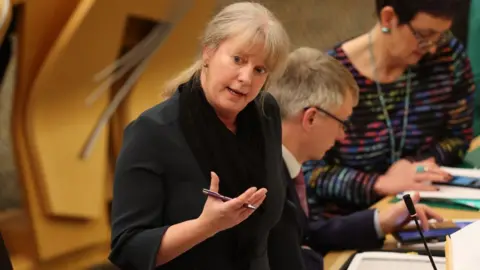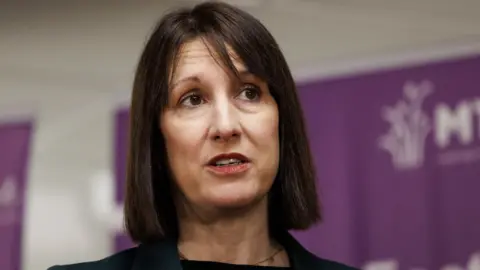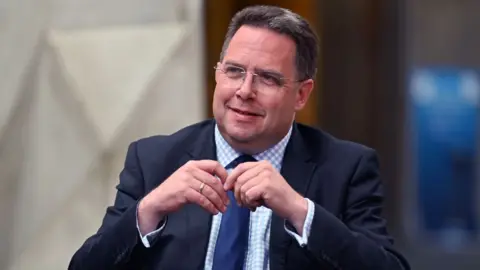Extra funds to help councils cover tax rise
 PA Media
PA MediaHolyrood ministers are to give councils an extra £144m to help offset a UK government rise in employers' National Insurance.
Finance Secretary Shona Robison said she aimed to cover 60% of the reported costs across the public sector.
She said the funding boost for local authorities was equivalent to a 5% increase in council tax, and would help avoid "inflation-busting" rises in council charges.
Council body Cosla estimated in November that the National Insurance increase would directly cost local authorities £265m.
Robison's announcement came as the Scottish government's Budget for 2025-26 passed its first parliamentary vote.
The tax and spending plans are expected to be made into law later this month following two more stages of scrutiny from MSPs.
Labour Chancellor Rachel Reeves announced last year that the rate of employer National Insurance contributions is to increase from 13.8% to 15% in April.
The threshold at which employers have to start paying the contributions is also being lowered from £9,100 to £5,000.
 PA Media
PA MediaThe Scottish government estimates it will need about £550m to cover the increased costs for public sector workers, rising to £750m when indirect employees such as those in childcare, higher education or social care are included.
SNP ministers have been told to expect about £300m in compensation from the Treasury. This figure is based on the Barnett formula – designed to give devolved nations a proportionate share of spending in England.
Addressing MSPs, Robison said Scotland should not be "punished" for deciding to spend more on its public service, which is proportionally larger and better paid relative to the UK as a whole.
The finance secretary described the proposed compensation from the Treasury as "unacceptable" and said it should "fully fund the actual costs for Scotland's public sector".
Announcing the extra funding for local authorities, Robison cautioned against large council tax rises.
A Holyrood freeze on the levy is to be lifted by the government in April, with some councils reportedly considering double-digit increases.
The Treasury had said it had to make difficult financial decisions as it faced a £20bn black hole in public finances.
A spokesperson said previously that the Scottish government had received a record £47.7bn budget "as part of support provided in relation to changes to employer National Insurance".
Budget debate
The minority SNP administration has done deals with the Greens and Liberal Democrats to ensure its Budget passes. Alba's sole MSP is also supporting it.
Labour will not vote against the plans, leaving only the Conservatives in opposition to them.
Robison, introducing the Budget bill to parliament, said: "At the start of this year the first minister said there is nothing wrong in Scotland that can't be fixed by what is right in Scotland.
"This budget is all about putting the resources in place to do just that."
Among her government's key proposals are plans to in effect scrap the two-child benefit cap, though no funds have been allocated to that ambition in the coming financial year.
Ministers also say they will provide a winter fuel payment for every pensioner household in Scotland next year.
She said the Budget would deliver record funding for health and social care, more than £15bn for councils and "progressive" tax choices that help low-income and middle-income families as well as "hard-pressed" businesses.
 Getty Images
Getty ImagesScottish Conservative finance spokesperson Craig Hoy accused Holyrood's other parties of conforming to a "failed cosy socialist consensus".
He added: "A consensus that's wedded to high tax and low growth. And which stands in stark contrast to our commons sense Budget plans."
He criticised the Scottish government for not replicating the UK government's business rates relief south of the border.
Robison said the SNP administration's small business bonus scheme was the most generous of its kind in the UK.
'Nowhere near good enough'
Scottish Labour finance spokesperson Michael Marra described the Budget as "more of the same" and "nowhere near good enough".
However, he said his party would not vote against the plans because Labour "desperately" wanted Scottish ministers to improve frontline services using record funding provided by the Treasury.
Scottish Green finance spokesman Ross Greer criticised Labour's decision not to back the tax and spending plans.
He said: "I can list a long list of achievements for people and planet as a result of the Greens engagement in this budget, compared to a Labour Party that got everything it asked for out of this budget, because it simply asked for nothing."
Scottish Liberal Democrat leader Alex Cole-Hamilton said his party would "always act responsibly and try to find common ground where it exists".
But he added that support for the Budget does not equal support for the Scottish government, which he said had "failed" the country.
The Budget passed the stage one ballot by 74 votes to 30, with 21 abstentions.